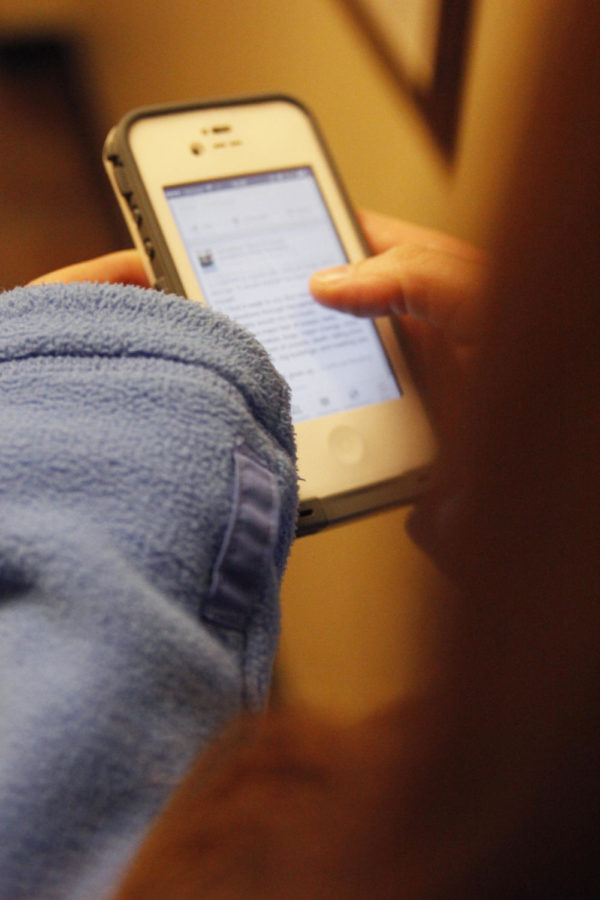Greer: Smartphone rehab: Relearn how to communicate in person, face to face
Jonathan Krueger/Iowa State Daily
Discover the benefits of taking a break from being attached to our phones and up to date with people every second of the day. Make a priority out of face-to-face communication.
November 14, 2013
I’m going to smartphone rehab. I still text a few friends from my hometown; I’ll pick up when my mom calls me; and I use my guitar tuning app every so often when I feel the need to jam; I won’t deny that my smartphone has its uses.
But I’m getting absolutely sick of this constant flow of superficial communication; the instant gratification that accompanies smartphones (and modern technology in general) has become society’s addiction. Want to know about that cute guy in your psych lecture? Don’t talk to him, just Facebook stalk him. We have to know everything, and we have to know now.
So when I quit responding to the buzz of my Droid like Pavlov’s dog to the ring of the bell, my friends panic. A simple “where are you? :)” seems friendly enough the first time, but when those words appear on my screen again and again, night after night, I stop replying.
I learned the difficult way that not responding to a text can be considered a personal affront. Does anyone else on the planet need to be alone for two seconds in complete silence? Or am I headed for the home?
The second you quit firing back instantly during a conversation, you might as well have become a missing person. Minutes later, another friend texts you something like “hey, is everything ok?” Once upon a time, I was guilted into easing people’s minds, surrendering my whereabouts so they could find me and hang out. Now I’m a stone-cold, heartless, nonreplying harpy.
For a culture so absorbed in the importance of physical appearance, we don’t put much stock in face-to-face communication (Skype and FaceTime don’t count). I can understand why people would give a damn about appearances if they spent any time in intelligent, meaningful face-to-face conversation, but I don’t see an overabundance of that sort of communication occurring.
What exactly are good friends supposed to talk about when they see each other for the first time in months if they’ve kept up with each other down to the bowel movements during every waking moment they’ve been apart? The reunion isn’t nearly as special as it would have been if not a single word was exchanged.
And we’re not just addicted to the instant gratification; we’re completely losing our people skills. Carrying on a conversation over text allows for a moment to collect thoughts, correct grammar and, on occasion, think of something clever to say. Too many people lose their charm the instant a face-to-face, real time conversation starts. Texting makes it too easy to trick someone into believing you’re a funny, quick-witted soul, and the real life interactions that follow become disappointing and uncomfortable for both parties.
I’m getting clean of my texting habits because I want to be able to speak coherently in real time, and because I want to better appreciate speaking with friends that I don’t see every day.
The smartphone debate has been beaten to death, but let me say this much: when we stop fighting over whether phones are “good” or “bad,” we can start teaching future generations through example that life is not lived on keyboards, and instant technological communication is a convenient backup, not a replacement, for face-to-face conversation.







